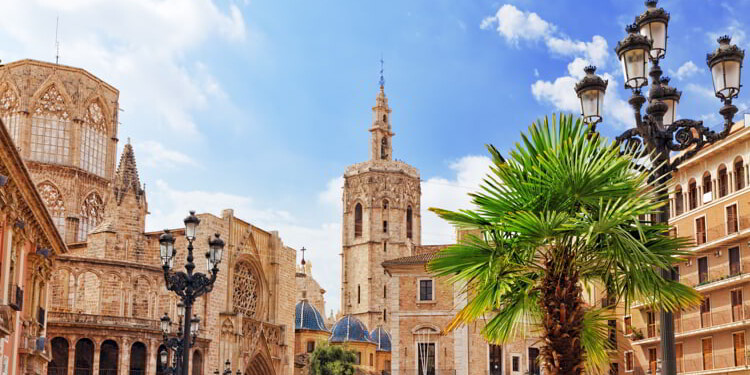“I didn’t want an expat hell hole…”
Eugene chuckled, “Blunt, but you know what I mean, right? I didn’t want to be a ‘bad Brit.’”
Eugene Costello, a mid-50s Londoner, was telling me how he arrived at the decision to move to Valencia three years ago.
Yes, I assured him, I knew what he meant.
So much of Spain is already well populated by British expats, and there’s a self-acknowledged tendency for them to create enclaves… “Little Britains.”
Andalucía, with its famous Costa del Sol and well-known cities like Málaga and Marbella, is packed with Brits, with a reported 92,000 living in the region in 2022.
They’re not the only ones moving in—Spain has the fourth highest rate of immigration in Europe and expats make up nearly 13% of its population. Americans are somewhat new to the scene, though…
“A couple of years ago I had never heard an American accent on the street, now it seems half the tourists are American,” Eugene noted.
He went on with his process of elimination…
“Knowing that I didn’t want to live surrounded by Brits eliminated a good portion of the coast.
“I like cities, so I thought about Barcelona, but it was a bit too big, more touristy, more expats… and there’s more street crime there.
“I did some research and came up with Seville. On paper it looked like just what I wanted. I have a good friend back in London, Annie Bennett, a Spain correspondent for The Telegraph, so I went to her for advice.
“She told me Seville is unbearably hot for most of the year, so I visited and came to the same conclusion. It wasn’t just the heat, it was the lifestyle that was a result of it.
Start Your New Life Today, Overseas
“From about May to September, everything closes at noon and opens again around 7 p.m., when it’s not too hot to be out anymore. You walk around in the afternoon and it’s a ghost town—shutters all sealed tight against the sun, all businesses closed, no one out. Not the best atmosphere…
“Annie and I got to talking again and she suggested Valencia, specifically, the Ruzafa neighborhood.”
Ruzafa—where he rents a four-bedroom apartment for just 920 euros—is a hip-feeling, artsy neighborhood. It’s been called “the creative soul of Valencia” and has a cool, laid-back vibe. Loaded with coffee shops, bookstores, combos (like the one where Eugene and I met), bakeries, thrift stores, funky boutiques, and art galleries… this is a great location in the city.
“I came to try out Valencia and set up a few apartment visits,” he continued. “I had one last viewing—it was on the way to the airport as I was leaving—and I fell in love with the place. It’s a big, open apartment in an historic building, with all its original traditional Valencian tiling. It’s got two balconies, which are key—you want to enjoy life outdoors when you’re living in this climate.”
We paused as a neighbor stopped by to pet Gili, his black lab, adopted since he moved here. They shared some chit chat while I stole bites of pan con tomate and sips of café con leche.
We would go on to pause every few minutes like this, as someone he knew walked by and they exchanged pleasantries…
Eugene has obviously integrated fully into his new life in Spain, so I asked his best advice for settling in as a foreigner.
“Well, first off, Valencia is an incredibly friendly and mild-mannered city, and you have to be careful what you read online… and maybe how you represent yourself as a potential expat.
“There are all these forums and groups online with people asking for advice on moving to Valencia, and sometimes they don’t go about it right. They ask for the English-speaking neighborhoods or the American schools and locals are resentful of that. They’ll shout you down online if that’s how you’re coming at it.
“But that’s just a lot of digital noise. When you get here—as long as you’re respectful—it’s a welcoming place.”
(As evidenced by his myriad local friends passing by…)
So what does Eugene do with his time here?
Journalist by trade, he founded Valencia Life, a news and information site, not long after arriving. Reporting on local items is fun for him, and it’s been successful, to boot.
“Plus,” he adds, “the work-life balance is great. There’s so much less stress here.”
What else does he like about life in Valencia?
“It’s incredibly safe. There’s practically no street crime, and violent crime is unheard of. It’s the third-largest city in Spain, but that’s really misleading because it’s so much smaller than Madrid, at nearly 3 million, or Barcelona, at a million and a half—our population is only about 700,000, and that includes the suburbs.
“As I said, it’s a mild, even-tempered city. No one shouts or argues here… it’s so laid back…
“The city feels more like a collection of neighborhoods than a cohesive city. A lot of locals think of the barrios like pueblos, kind of like their hometowns—they don’t like to venture out of their own territory.
“It’s a dog-friendly city, and it’s close to beaches and the countryside if you want some seclusion. Plus mountains—skiing isn’t far, you could ski and swim in the sea in the same day.
“Prices have been good. Eating out is especially good value—you can still get a three-course menu del día for 10 euros.”
What practical tips does Eugene have for potential expats?
“You need to use a gestor for your residency—they help with immigration, but they aren’t lawyers. Get a lawyer for your property purchase. Make sure to get a referral for someone reputable on both counts.
“If you’re coming in with a rental budget, don’t advertise it on the expat forums. Agents use those, too, and they’ll hike up the price of whatever they’ve got to meet your budget.
“If you smoke, know that tobacco shops are only open from 12-3 p.m. and 5-8 p.m., never on Sundays, and you can’t buy them otherwise.”
Bonne route,

Kat Kalashian
Editor, In Focus: Europe










